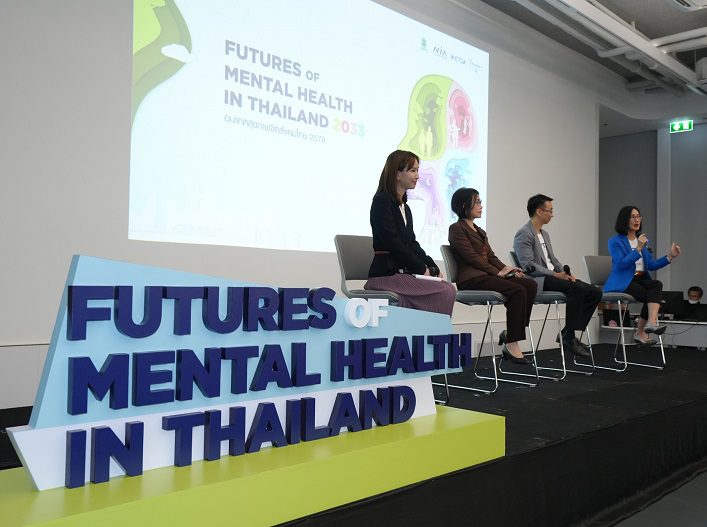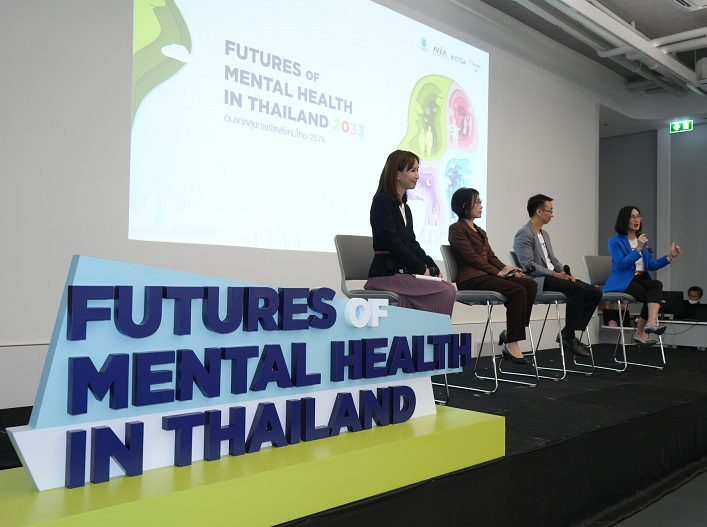The Ministry of Public Health’s Department of Mental Health with the National Innovation Agency (Public Organization) (NIA), the Ministry of Higher Education, Science, Research and Innovation’s Electronic Transactions Development Agency (ETDA), and FutureTales Lab by MQDC has published “Futures of Mental Health in Thailand 2033” with insights and recommendations for developing mental healthcare. The 4 organizations have also signed an agreement to develop a network for innovation and mental health education to promote
The Ministry of Public Health’s Department of Mental Health with the National Innovation Agency (Public Organization) (NIA), the Ministry of Higher Education, Science, Research and Innovation’s Electronic Transactions Development Agency (ETDA), and FutureTales Lab by MQDC has published “Futures of Mental Health in Thailand 2033” with insights and recommendations for developing mental healthcare.
The 4 organizations have also signed an agreement to develop a network for innovation and mental health education to promote and develop mental healthcare in Thailand.
Dr. Amporn Benjaponpitak, Director-General of the Department of Mental Health, said: “Social change can make life harder, while Thai culture severely stigmatizes people with mental health problems. Mental health awareness is still low. Promoting mental health isn’t given the attention it deserves. Many Thais still don’t know about mental health for themselves, their families and community, leading them to reject mental health services. This situation aligns with rising mental health problems in Thailand. Social changes cause a variety of mental health problems, such as stress, depression, burnout, and in some cases self-harm. A mental health survey in 2022 with 1,149,231 respondents found a risk of depression of 5.47%, burnout of 4.59%, and high stress of 4.37%. People and all sectors need to focus and cooperate to address mental health problems. Without full understanding of the future of mental health in Thailand, society may face serious mental health impacts. Future research studies into mental health are crucial for government and business to plan and prioritize for mental health issues in Thai society, the happiness of Thai people, and a mental health promotion and prevention plan. Policy and legislative mechanisms in all public and health sectors and all areas of people’s lives are needed for Thai society to develop toward a desirable mental health future. Preparing a memorandum of understanding on developing a collaborative network for innovation and future studies in mental health will be the starting point for integrating public and private sectors to improve mental health. The Department of Mental Health is willing to participate in the research and help communicate research results through various channels, including futurology so mental health policy suits the mental health landscape of the future with innovations and participation from all sectors across business, communities, and civil society for mental healthcare for all.”
Dr. Pun-Arj Chairatana, Executive Director of the National Innovation Agency (Public Organization), said: “NIA’s Innovation Foresight Institution, or IFI, promotes and supports the use of foresight in tracking economic, social, environmental, and lifestyle trends that may affect Thai mental health. Thais are reportedly facing more and more mental health problems each year. But access to mental health services isn’t comprehensive. In addition, with Thailand’s shift into an aging society, mental health problems among the elderly, and conflicts arising from age gaps, can’t be solved or prevented. Technology and innovation can be used for recreational media to help the mental healthcare system effectively improve the health of Thais. There are now Thai startups that offer innovative services for various mental health needs. A deep listening course has been certified by the Department of Mental Health in the form of a software-as-a-service (SaaS) online platform. Applications offer various fun mental health promotion activities to help users become more skilled and resilient in mental health. Chatbots collect activity data from users to analyze the risk of depression. These technological advances and innovations will help mental health professionals spend less time screening patients, leading to more accurate and effective treatment and care. ‘Futures of Mental Health in Thailand 2033’, from cooperation by 4 organizations, will be a tool to raise awareness of mental health as well as promoting and developing the use of innovation to help design a desirable future for Thai mental healthcare to cope with coming changes.”
Dr. Chaichana Mitphan, Director of the Electronic Transactions Development Agency (ETDA), said: “Foresight Center by ETDA is a think tank to monitor signals and trends for the future of electronic transactions, finding drivers to create scenarios and develop policy recommendations. Cooperation in ‘Futures of Mental Health in Thailand 2033’ by ETDA with 3 organizations will be an important step for government agencies and the private sector to come together to predict the future of mental health of Thais, showing dimensions to monitor or focus on, especially for developing technology to holistically, safely, and reliably improve the health of Thais. This study shows that technology has become part of the daily life of Thais. We see signs of technology and mental health in 2 key issues. In terms of readiness for the digital age, Thais are among the world’s top users of social media. But their knowledge can be limited, reflected by statistics for online scams, fake news, and misinformation, which rise each year. This is an important issue for the country, including how ETDA will move forward to promote digital technology while adding value to the country’s digital economy. Literacy must be developed to build immunity in the digital world for Thais and prevent health problems from the use of technologies. The study’s forecasts for the future mental health of Thais will lead to policy and directions for more efficient future care.”
Dr. Karndee Leopairote, Executive Vice President of FutureTales Lab by MQDC, said: “Mental health is now a top health concern for 36% of people, more than cancer at 34%. Mental health is as important as physical health for 76% of people.The UN has announced that 80% of its members will include mental healthcare within basic health by 2030. In Thailand, 80.6% of people in cities and 48.9% of rural residents experience a growing number of mental health problems. To improve well-being in cities we must understand and enhance people’s mental health to withstand events like epidemics and economic instability. This research underscores the value of foresight from key signals and future scenarios to understand mental health and develop guidelines and policies to meet coming changes.”
The collaboration aims to enhance the future mental health of Thais, presenting core issues, the current situation, signals of change, key drivers, the outlook, and policy proposals for developing the mental healthcare system for all sectors. The parties will also inform the public in terms of society, technology, economics, the environment, laws, policy, and values, including design for a desirable future for Thailand’s mental healthcare.
“Futures of Mental Health in Thailand 2023” reveals research and future scenarios to open new, broader perspectives for mental healthcare, including trends, innovations, and technologies to enhance the future of Thai mental health.


